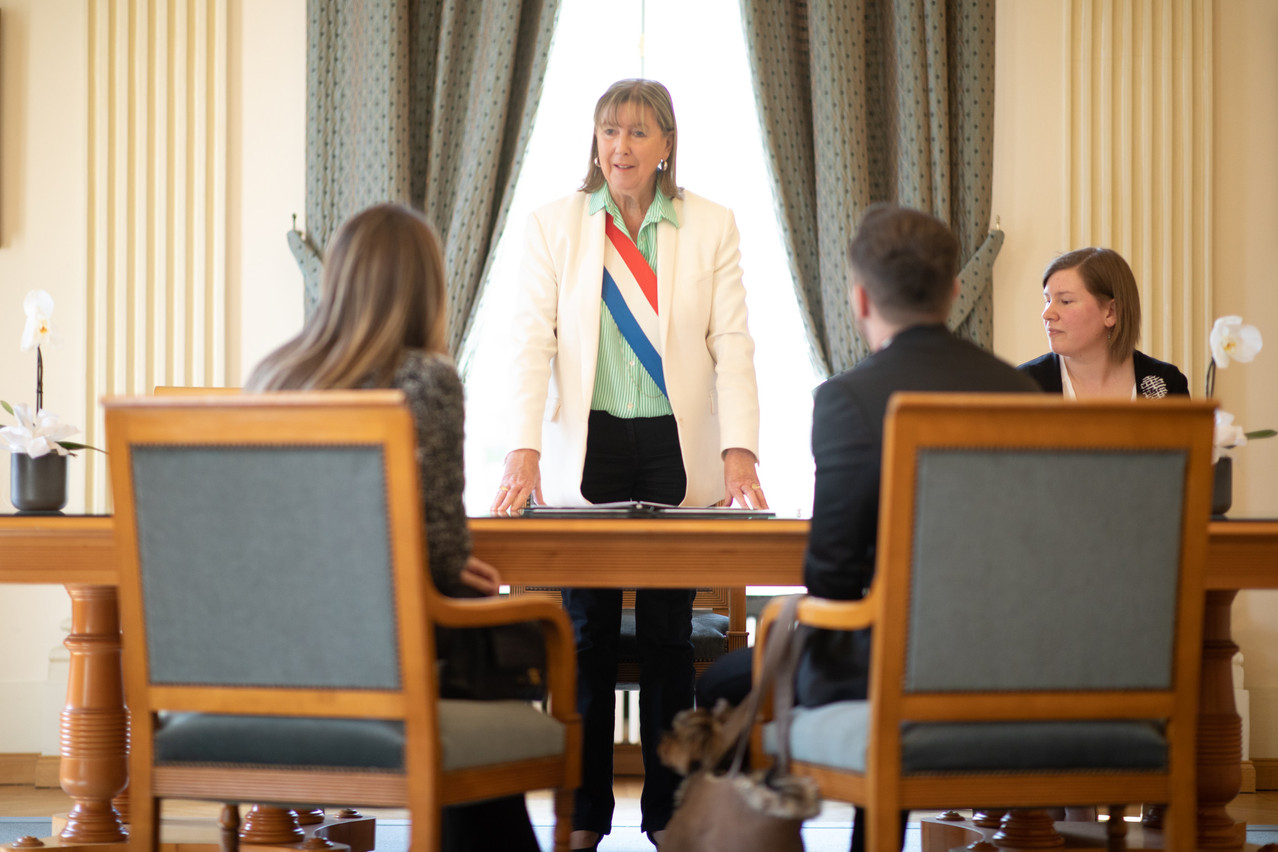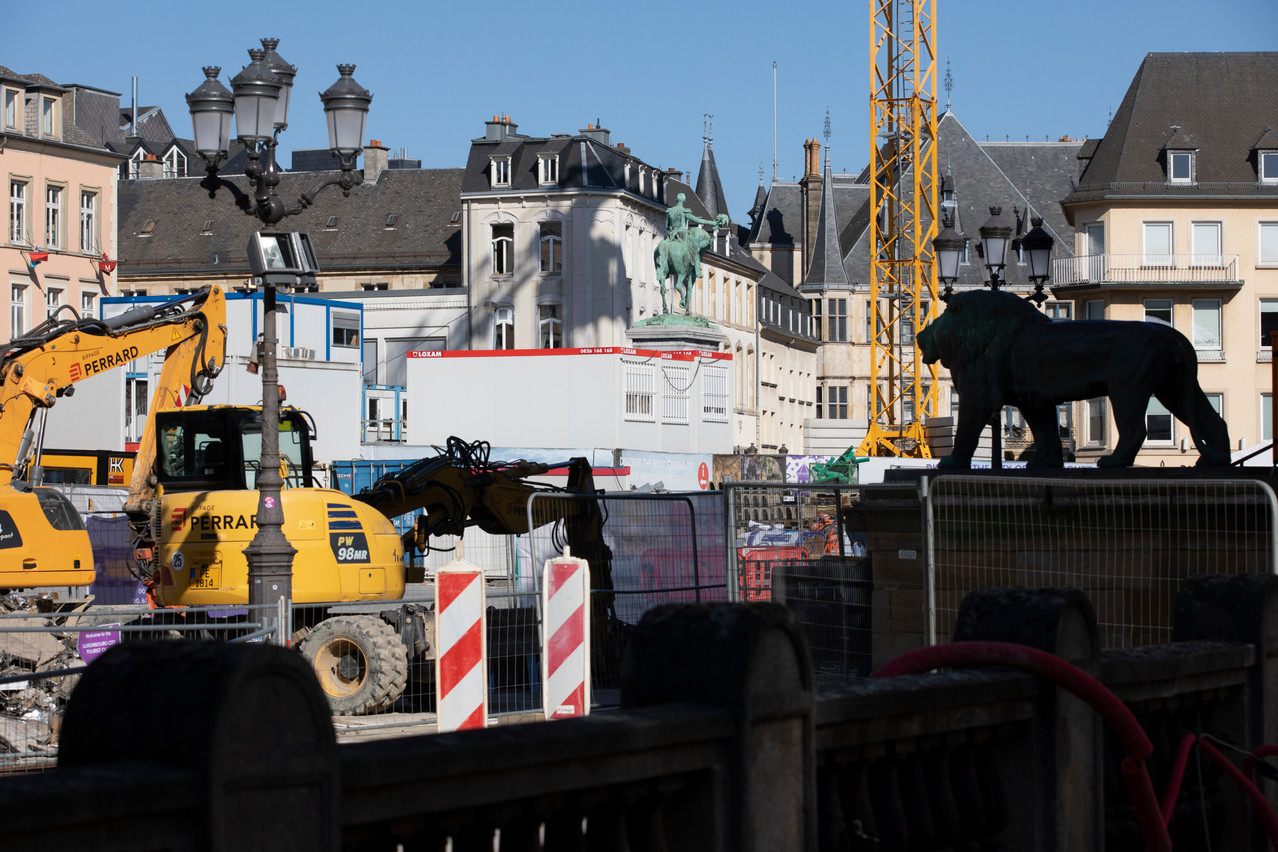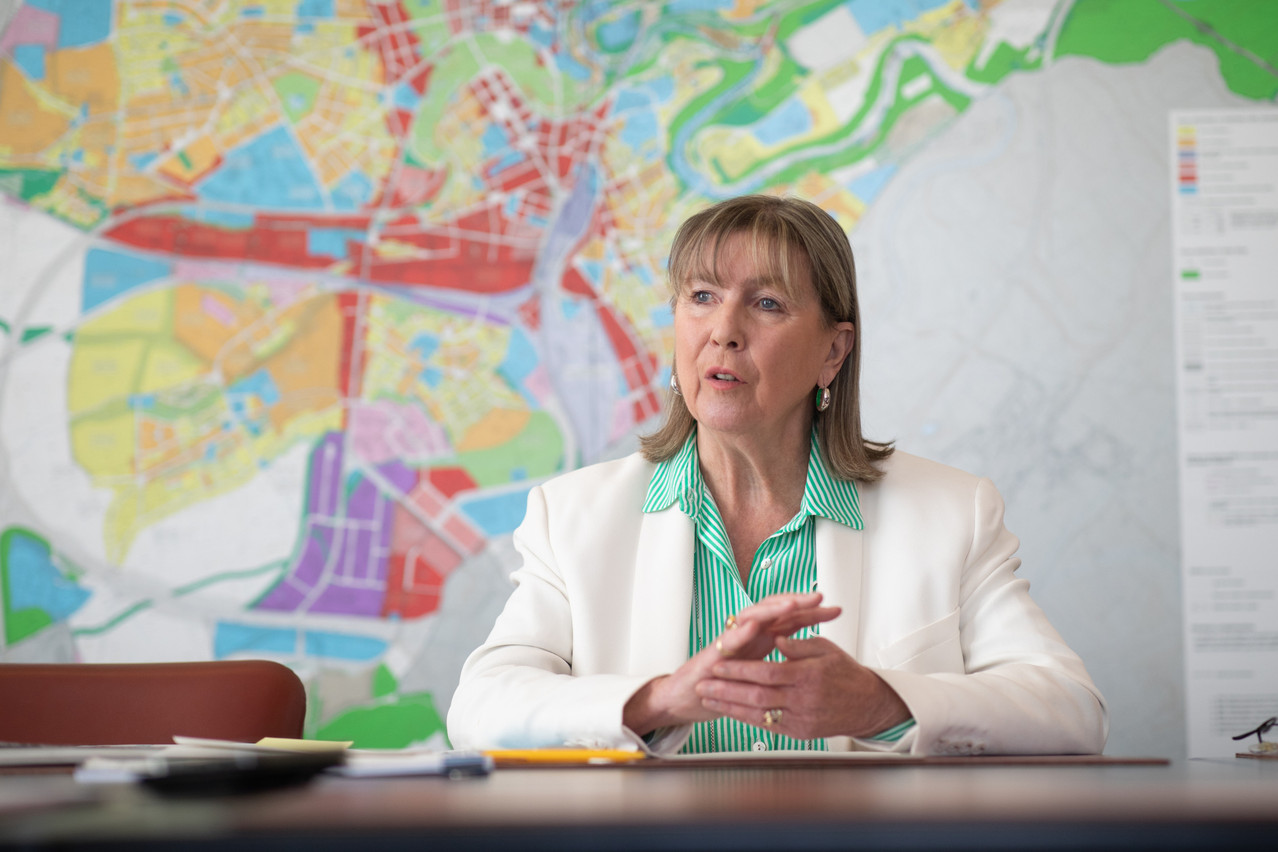Duncan Roberts: You and the college of aldermen are in the midst of the Schäfferot on Tour public meetings. How important is it to have this direct contact with residents and citizens?
Lydie Polfer: It is especially important after two years of the pandemic when we couldn’t hold such big meetings. Quite honestly, I have missed them. This direct contact with citizens allows you to really get a clearer picture of what concerns people have and where they have problems.
It’s not even that they are necessarily big problems; sometimes they are smaller problems, but people are really troubled by them.
I mean, there are some questions that we can’t answer directly. One lady asked why the pavement on her street was surfaced with asphalt as opposed to paving stones. I told her I couldn’t give her the reason, but that I would make enquiries and get back to her. The next day I found the answer and I called the lady in question to give her an explanation.
But that really is Luxembourg. We must take advantage of the proximity we have with the people and that they have with us. People shouldn’t be afraid to say something or to criticise us--though, of course, it depends on the manner in which they do it.
Exchanges with citizens show that society still functions. And that feels good. We work every day for the people, so it is important to have that direct contact.
You have also held citizen meetings on more specific subjects, including the mobility plan. What needs to be improved in terms of sustainable mobility in the city and managing the mix of expectations that residents and visitors to the city have?
The citizens’ participation meetings have been a great success. They allow people to tell us what they find good or what problems they might have, and we try to take their concerns into account. Of course, now and again, we receive contradictory opinions. Some will want more cars, others will want fewer. Some want more car parking spaces, others want fewer. But that’s our job, to take decisions in good conscience to find the best solutions.
How do you answer the very vocal critics who say not enough is being done for cycling infrastructure, for example?
It is our mission to make the city accessible for all participants. That includes pedestrians, cyclists, drivers of private vehicles and those who use public transport. And that is a real challenge. I think especially in the last five years we have done a lot--we have cycle paths parallel to the tram tracks, we have a new cycle path along the avenue de la Liberté, from the Pont Adolphe down to the station, we have added one on avenue Marie-Thérèse. And the developments will continue.
In the last 10 years, cycling in the city has become something of a new interest.
In the last 10 years, cycling in the city has become something of a new interest. We are working to maintain that. Creating safe routes for cyclists is something that is close to our heart--my own grandchildren cycle.
One major project that is being worked on is a cycle path along the entirety of the boulevard Prince Henri, which means cyclists coming from Kirchberg [can connect to that] using the cycle path we created behind the Fondation Pescatore. That means we will avoid conflicts. Because we know that cyclists in conflict with cars are weaker. But there are also conflicts between cyclists and pedestrians, as we have had sometimes in the park, and in those cases the pedestrians come off worse.
But you don’t get something for nothing. To create the cycle path on the boulevard Prince Henri, we are going to have to cut down a few trees. We have assessed the possibilities and are trying to keep it to the minimum possible because trees are real added-value to the city.
What we have done in avenue Pasteur also shows that we are trying to connect the major residential neighbourhoods--and Limpertsberg is one such case--with the centre.
The tram will soon be extended as far as Bonnevoie. Has it improved life and made the city more attractive, in your view?
The tram has been a great success. What’s more, we have a very nice tram--the nicest I know--and we did select [the design] very carefully. It has been very well accepted, but that means that certain habits that people had, especially those coming from outside the city, have had to change. Well, we’ve had criticism from RGTR [regional] buses, but I would say that the tram has led to a sort of calming of traffic in the city centre.
But the tram alone doesn’t really solve everything. The residents of the big residential neighbourhoods, whether that’s Bonnevoie, Gasperich, Cessange, Belair, Hollerich, Limpertsberg, still need city buses. And well-functioning bus stations on the periphery of the city are an absolute necessity. Otherwise we won’t have the traffic relief that we need. It is already working to some extent. If you remember what it was like before the tram, the city was full, full, full of [regional] buses. If you look at the figures now for air quality compared to earlier, then it is much better.
But the fact is that people still need to get into the city. This is our biggest challenge. The city accounts for 2% of the total land surface of the country. But half of the city is greenery--parks, forest, fields… So that leaves 1%, on which 20% of the population of Luxembourg live. But we also have 40% of the jobs in the country that are in the city. We have over 12,000 people coming into the city every day, including from abroad. If we only had to take care of the 128,000 residents of the city… our own city bus service would be sufficient.
Pedestrians are also very important. We are a small city, and so much is accessible on foot, for most people--of course, you can’t compare young, sporty people with the elderly. But one of our objectives is to make sure the neighbourhoods have all the facilities that people need for everyday life.

Lydie Polfer interrupted her interview with Delano to perform a wedding ceremony for a young couple Photo: Guy Wolff/Maison Moderne
Another major issue for the City has been security, especially in the Gare district where you have also been meeting with residents and business owners. Are you getting enough support from the national government and the police force to tackle crime and safety issues in that neighbourhood?
It is obvious, and nobody will contradict this, that a police presence is what is missing. The minister [Henri Kox] knows this as well. The minister and the government want to make a big effort to recruit new people, and some of them are already in training, but it will still take some time before they are ready to enter service. And the lack of their presence is very visible.
We have problems, mainly connected to drugs, in the Gare neighbourhood, but that problem has also moved partly to the upper city, to Hamilius and to the park near the pirate ship playground. We have to take measures somehow to get this under control.
The police know this too. I mean, I am not blaming the police at all. But, as I said, there is a lack of personnel.
We have undertaken so much with regards to social work in the area. We have around 20 Streetworkers [a service that offers assistance to homeless people]; we have night shelters so that people can sleep. But there are also a number of people who don’t want these services.
What is also missing are legislative measures to enable certain situations to be tackled better. For instance, we know that when people sleep in doorways of residences, they make a mess; people sometimes find it difficult to gain access to their home. We have long been promised legislation to deal with this, but they still haven’t arrived.
We also launched the À vos côtés [by your side] initiative in the Gare, in Bonnevoie, and it will soon be available in the upper city. These are people who have been trained by Inter-Actions [an association which aims to improve the lives of the socially disadvantaged] and who seek contact with local business people and residents, but also try to talk with other people to convince them not to behave badly.
The whole situation is frustrating for us as a commune. Because we are doing what we can.
This is uncivil behaviour that makes life much less agreeable. And they keep coming up with new kinds of criminal behaviour. Last year there was a gang that was tearing necklaces off people. The police even managed to catch a number of them. But I can’t tell you whether they are now sitting in Schrassig [the state penitentiary]--that is me being very diplomatic. Then we also have systematic pickpockets, which the police are aware of and have acted upon.
But the whole situation is frustrating for us as a commune. Because we are doing what we can, but that is limited to the social programme--providing housing, cleaning and paying for a lot of staff. We should be able to act with more consequence. But as mayor I am not in charge of the police at all since the major reform of 1998 that merged the police and gendarmerie into the Police Grand-Ducale. Before that we could, at an additional cost, deploy the police in certain situations.
Will the council consider a new contract with a private security firm if the security situation deteriorates again? If so, what guarantees can be put in place to ensure the security firm’s employees do not overstep their boundaries?
A projet de loi [draft law] is currently being worked on to better regulate private security firms and surveillance. This should clarify a lot of things so that we don’t need to have that discussion again.
We need the legal framework to be able to move people on. That is also being worked on, but the state council still needs to give its opinion on the bill. We need this so that the police have more means to intervene. It will allow them to oblige someone to move on, which the police say they are currently unable to do. Of course, this will have to be done with our social services, and we will gladly put them at their disposal.
But the current situation is unsatisfactory. People who work in restaurants are afraid to leave at 10 o’clock at night.
The capital has a very cosmopolitan demographic, with 70% of residents being non-Luxembourgers…
And of those 70%, the vast, vast majority are from the community, European Union citizens. If we look at the figures from 31 December 2021, we had 128,514 inhabitants. Of those, 37,799 were Luxembourgers, 72,250 were from other EU countries, and 5,188 were citizens of other European countries.
The City has made a real effort to encourage integration…
We do a lot. Luxembourgish courses, all our various clubs. I mean, the clubs no longer talk about how many foreigners they have as members. They are not foreigners, they are our neighbours, our colleagues, our friends.
Of course, the way that Luxembourgers go about things in terms of languages helps a lot. We switch from one second to the next to French, or I’ve just conducted a wedding in German, then we speak German. The same in English, although maybe not all are completely comfortable in English… but in general it helps, and it is noticeable how many non-Luxembourgers feel at home here. We have our website in English; we publish our magazine, City, in English [and French]. We really are a multicultural and open society.
We really do a lot. However, you can do as much as you want, but if people don’t know about it, then it’s as if you didn’t actually do anything.
When we had the mini-Schueberfouer [funfairs] in the neighbourhoods during the pandemic, they were well received--it was a great way for people to meet each other. In a city like ours, with 70% non-Luxembourgers, it is very important to have places where people can get to know each other in a normal, natural way. We will try to maintain that sort of thing somehow.
One year from the next local elections, how will the Ville de Luxembourg encourage non-Luxembourg residents to register to vote? Do you have figures of how many non-Luxembourgers voted in the 2017 local elections in the city?
As we know there is a new law underway that will remove the [five-year] residency requirement to vote in the local elections. We will have to see if that brings more voters.
In the last local elections in 2017, we had 6,677 non-Luxembourg voters who registered. That compares to 27,722 Luxembourgers. So nearly 20% of the voters were non-Luxembourgers.
That may not reflect the 70%, but it was certainly an improvement on previous elections, when I think it was around 10%.
Many of those who attended the citizens’ meetings spoke English, German, French… for us that is quite normal.
The programme for this legislature was obviously affected significantly by the covid pandemic, but what big projects does the Ville de Luxembourg still have to complete before the elections in 2023?
Oh, my! There are so many. We are finishing the restoration of place Guillaume II, and we have been working like earthworms. Of course, nearly all the big building projects have been delayed because companies had to shut down [during the pandemic] and then they have had problems with delivery of materials.
Then, in Cents, we have the new complex for the National Sports Institute, which is almost complete, apart from some problems with the swimming pool. We have a series of new crèches that are being built.
We have big urban housing projects along the route d’Arlon, the porte de Hollerich, Villeroy & Boch. And we will get a new hygiene and recycling service, which is connected with the route d’Arlon project and will be installed behind the Merl cemetery.

Works on the Knuedler car park and the-paving of the square above it have left Place Guillaume II a construction site for months Photo: Guy Wolff/Maison Moderne
A new bus garage will be built behind the stadium in Kockelscheuer because of the porte de Hollerich development. And we are planning a new athletics stadium because the football and rugby stadium can’t host athletics. That will be built in Hamm.
The Beggen water purification plant is also being expanded, though that won’t be ready until 2027 or 2028. The current plant was built to serve 200,000 people but will in future be able to handle the needs of 400,000 inhabitants.
Also we have to complete the naturalisation of the Pétrusse river. It will be ready in 2023, ahead of the Luga [Luxembourg Urban Garden] show. We also recently took a look at the new park in Gasperich, which will be officially inaugurated next year.
We also have many projects together with the social housing scheme.
Thankfully, we also have the financial means available.
The ING Night Marathon is on the horizon, a return after two years of pandemic cancellation. Does the marathon and other cultural events and institutions, like Les Théâtres de la Ville de Luxembourg, help put Luxembourg City on the map and attract an international population?
The pandemic was a very difficult two years for all those people. The city theatres [Grand Théâtre and Théâtre des Capucins] belong entirely to the City, and it was heavy for them. We had our own productions, and there were productions that we buy in for Luxembourg. But they are up and running again.
The Luxembourg City Film Festival, which we support 50-50 with the state, also suffered.
We are all very pleased that the marathon is able to take place again, that we are returning to the normality of being together again.
The pandemic taught us a lot of things, and it also showed us what really matters
The pandemic taught us a lot of things, and it also showed us what really matters, which is social contacts, being together with people. I mean, it was terrible for people in retirement homes and hospitals, people who died without having their family at their side. Those were terrible times.
People in the different neighbourhoods [along the route] often celebrate the marathon at home with friends. But the marathon also has a certain impact on the economy. I mean, we have 12,000 registered runners this year, which is slightly down on the 16,000 we’ve had in previous years, even though the marathon started out as a small event. But they reckon visiting runners stay on average two nights, and we calculate that on average each runner has 1.6 people in their entourage. So you can imagine how many hotel nights that means, and they also all have to eat.
So I hope the marathon, which takes a lot of hard work to organise, turns out to be a festive occasion, for those who are running and for those who come to the city to watch.



